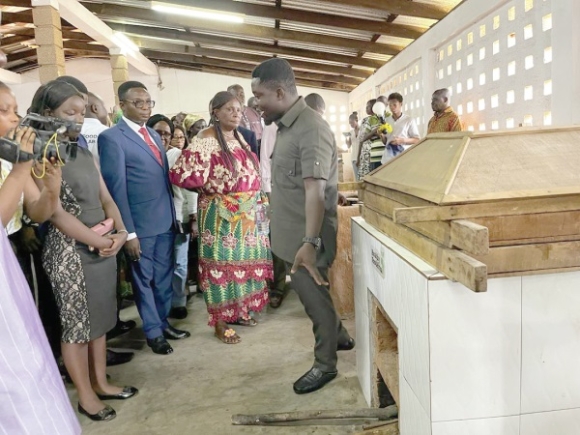
Prioritise innovative value addition to fish farming — Food Research Institute Director
To unlock the full potential of aquaculture, Ghana must focus on adding value to fish through innovation, the Director of the Council for Scientific and Industrial Research-Food Research Institute (CSIR-FRI), Prof. Charles Tortoe, has said.
He said innovation in areas such as processing techniques, product diversification and sustainability practices can transform Ghana's fish farming industry, making it more competitive on both domestic and international markets.
This, he said, would drive economic growth, create employment opportunities and contribute to food security and nutrition in the country. Prof. Tortoe was speaking at the Healthfoods Africa dissemination workshop in Accra.
The event also saw the Institute's official launch of the Fish Smoking Oven Museum.
Fish Smoking Ovens Museum
The Fish Smoking Ovens Museum, under the EU-sponsored HealthyFoodAfrica Project being implemented by the CSIR-FRI and Water Research Institute, forms part of efforts to improve nutrition in Ghana and enhance the aquaculture sector.
The museum, the first of its kind in the sub-region, aims to preserve the history of fish smoking while serving as a centre for learning, research and technology development.
It features a fish smoking oven technology that will provide some comfort for fish processors by reducing the high levels of smoke exposure, which often exceeds World Health Organisation safety guidelines, resulting in burning, dizziness and eye irritation during operation.
“Aquaculture has witnessed significant growth over the years as a vital source of protein for millions and also offers significant economic opportunities for communities worldwide.
“However, to fully gain from the potential of aquaculture, we must not only focus on fish production but also on fish value addition, the process of enhancing the value of a product through various means such as processing, packaging and marketing,” he said.
He added that the safety and quality of the fish products on the domestic markets must equal that on the international markets. “At CSIR-FRI, we do not want to miss our way forward on fish-smoking ovens.
We have created this fish smoking ovens museum to bring the history of fish smoking in Ghana to life. We envisage the fish smoking ovens museum to serve as a hub for learning, research and technology development on fish smoking ovens in Ghana and the sub-region,” Prof. Tortoe said.
Enabling environment
He further called on policymakers to create an enabling environment for the aquaculture sector to thrive.
“This includes implementing supportive policies, providing incentives for investment in value addition infrastructure and ensuring that regulatory frameworks are conducive to innovation and growth.
“Researchers and academia are also instrumental in driving these innovations in aquaculture and value addition, translating the research findings into practical solutions that benefit the entire value chain,” he stated.
A Senior Research Scientist at FRI-CSIR and a Co-Project Lead, Dr Amy Atter, said women spent at least six hours each day engulfed by the smoke emanating from their basic wood-fired mud ovens.
She said the modified oven technology addressed the flaws of "Ahoto", "Chorkor" and other types of ovens by offering fishmongers three sources of energy -charcoal, firewood and liquified petroleum gas- to promote rapid cooking and efficiency.
"The dimension of the combustion chamber and the combustion tube have been increased to accommodate more fuelwood and increase transmission of heat for rapid cooking," she said.
Statistics
According to a survey by statista, aquaculture production in Ghana amounted to some 89,400 metric tons in 2021.
This volume represented a dramatic increase from 2008 when the country registered only 5.59 metric tons of plants grown in water and fish produced for food.
Currently, tilapia and catfish are the two most common species of fish in aquaculture production in Ghana.
In 2021, the country produced around 68,700 metric tons of tilapia and 20,660 metric tons of catfish. Also, the total revenue from aquaculture production in the country amounted to GH₵1.7, about $140 million, that year.